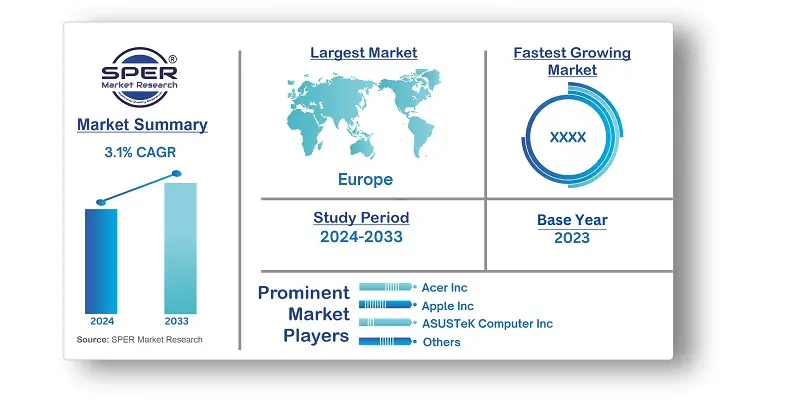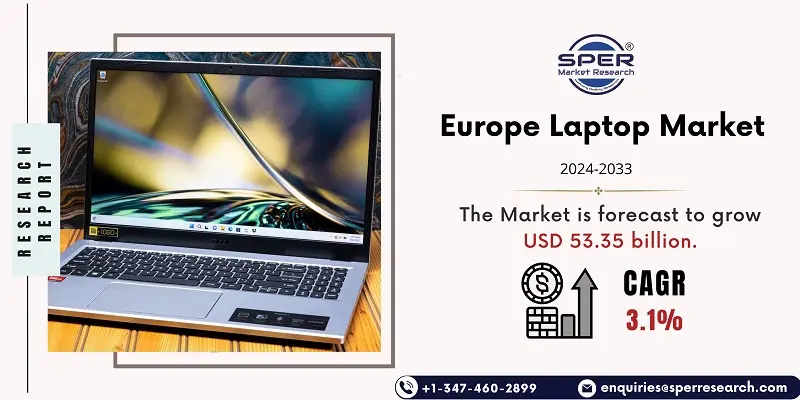
Europe Laptop Market Growth, Size, Trends, Demand, Revenue, Competition and Future Outlook
Europe Laptop Market Size- By Type, By Screen Size, By Price, By End User- Regional Outlook, Competitive Strategies and Segment Forecast to 2033
| Published: Apr-2024 | Report ID: FMCG2492 | Pages: 1 - 152 | Formats*: |
| Category : Consumer & Retail | |||

- Remote Work and Hybrid Work Models: The continued use of remote work and hybrid work models creates an opportunity for laptops designed to meet the needs of professionals working from several places. Devices with improved collaboration capabilities, connection, and security can thrive in this environment.
- Form Factor Innovation: Foldable or dual-screen laptops, for example, have the potential to pique customer attention. Unique designs that increase productivity or provide a novel user experience offer potential for market differentiation.
- Embracing sustainability techniques, such as employing recycled materials and developing energy-efficient designs, can provide a strategic advantage. Consumers are increasingly prioritising environmentally friendly items, and sustainability activities can boost company reputation.
- Intense Competition: The laptop market is extremely competitive, with many global and regional firms. Intense rivalry can result in price wars and narrow profit margins for producers and retailers, affecting overall market dynamics.
- Rapid Technological Changes: Manufacturers face obstacles as technology advances at a rapid rate. Consumers frequently anticipate the most recent features and performance enhancements, making it critical for businesses to stay current with quick technological advancements.
- Price Sensitivity: Price remains an important component in purchase decisions. High-end laptops with premium features may struggle to attract budget-conscious customers, particularly during economic downturns.

| Report Metric | Details |
| Market size available for years | 2020-2033 |
| Base year considered | 2023 |
| Forecast period | 2024-2033 |
| Segments covered | By Type, By Screen Size, By Price, By End Use |
| Regions covered | Belgium, France, Germany, Italy, Netherlands, Russia, Spain, Switzerland, The U.K., Turkey, Rest of Europe |
| Companies Covered | Acer Inc, Apple Inc, ASUSTeK Computer Inc, Dell Inc, HP Inc, Lenovo Group Ltd, Micro-Star INT’L Co, Ltd, Microsoft Corporation, Razer Inc, Samsung Electronics Co, Ltd, Others |
- Consumers
- Business Professionals
- Students
- Gamers
- Educational Institutions
- Corporations
- IT Departments
- Retailers
- Distributors
- Manufacturers
- Others
| By Type: |
|
| By Screen Size: |
|
| By Price: |
|
| By End Use: |
|
- Europe Laptop Market Size (FY’2024-FY’2033)
- Overview of Europe Laptop Market
- Segmentation of Europe Laptop Market By Type (2-in-1, Traditional)
- Segmentation of Europe Laptop Market By Screen Size (Up To 10.9†Inch, 11†To 12.9†Inch, 13†To 14.9†Inch, 15.0†To 16.9â€, More Than 17â€)
- Segmentation of Europe Laptop Market By Price (Up to USD 500, USD 501 to USD 1000, USD 1001 to USD 1500, Others)
- Segmentation of Europe Laptop Market By End Use (Business, Gaming, Personal)
- Statistical Snap of Europe Laptop Market
- Expansion Analysis of Europe Laptop Market
- Problems and Obstacles in Europe Laptop Market
- Competitive Landscape in the Europe Laptop Market
- Impact of COVID-19 and Demonetization on Europe Laptop Market
- Details on Current Investment in Europe Laptop Market
- Competitive Analysis of Europe Laptop Market
- Prominent Players in the Europe Laptop Market
- SWOT Analysis of Europe Laptop Market
- Europe Laptop Market Future Outlook and Projections (FY’2024-FY’2033)
- Recommendations from Analyst
1.1. Scope of the report1.2. Market segment analysis
2.1. Research data source2.1.1. Secondary Data2.1.2. Primary Data2.1.3. SPER’s internal database2.1.4. Premium insight from KOL’s2.2. Market size estimation2.2.1. Top-down and Bottom-up approach2.3. Data triangulation
4.1. Driver, Restraint, Opportunity and Challenges analysis4.1.1. Drivers4.1.2. Restraints4.1.3. Opportunities4.1.4. Challenges4.2. COVID-19 Impacts of the Europe Laptop Market
5.1. SWOT Analysis5.1.1. Strengths5.1.2. Weaknesses5.1.3. Opportunities5.1.4. Threats5.2. PESTEL Analysis5.2.1. Political Landscape5.2.2. Economic Landscape5.2.3. Social Landscape5.2.4. Technological Landscape5.2.5. Environmental Landscape5.2.6. Legal Landscape5.3. PORTER’s Five Forces5.3.1. Bargaining power of suppliers5.3.2. Bargaining power of buyers5.3.3. Threat of Substitute5.3.4. Threat of new entrant5.3.5. Competitive rivalry5.4. Heat Map Analysis
6.1. Europe Laptop Market Manufacturing Base Distribution, Sales Area, Product Type6.2. Mergers & Acquisitions, Partnerships, Product Launch, and Collaboration in Europe Laptop Market
7.1. Europe Laptop Market Size, Share and Forecast, By Type, 2020-20267.2. Europe Laptop Market Size, Share and Forecast, By Type, 2027-20337.3. 2-in-17.4. Traditional
8.1. Europe Laptop Market Size, Share and Forecast, By Screen Size, 2020-20268.2. Europe Laptop Market Size, Share and Forecast, By Screen Size, 2027-20338.3. Up To 10.9†Inch8.4. 11†To 12.9†Inch8.5. 13†To 14.9†Inch8.6. 15.0†To 16.9â€8.7. More Than 17â€
9.1. Europe Laptop Market Size, Share and Forecast, By Price, 2020-20269.2. Europe Laptop Market Size, Share and Forecast, By Price, 2027-20339.3. Up to USD 5009.4. USD 501 to USD 10009.5. USD 1001 to USD 15009.6. Others
10.1. Europe Laptop Market Size, Share and Forecast, By End Use, 2020-202610.2. Europe Laptop Market Size, Share and Forecast, By End Use, 2027-203310.3. Business10.4. Gaming10.5. Personal
11.1. Europe Laptop Market Size and Market Share
12.1. Europe Laptop Market Size and Market Share By Region (2020-2026)12.2. Europe Laptop Market Size and Market Share By Region (2027-2033)12.3. Belgium12.4. France12.5. Germany12.6. Italy12.7. Netherlands12.8. Russia12.9. Spain12.10. Switzerland12.11. The U.K.12.12. Turkey12.13. Rest of Europe
13.1. Acer Inc13.1.1. Company details13.1.2. Financial outlook13.1.3. Product summary13.1.4. Recent developments13.2. Apple Inc13.2.1. Company details13.2.2. Financial outlook13.2.3. Product summary13.2.4. Recent developments13.3. ASUSTeK Computer Inc13.3.1. Company details13.3.2. Financial outlook13.3.3. Product summary13.3.4. Recent developments13.4. Dell Inc13.4.1. Company details13.4.2. Financial outlook13.4.3. Product summary13.4.4. Recent developments13.5. HP Inc13.5.1. Company details13.5.2. Financial outlook13.5.3. Product summary13.5.4. Recent developments13.6. Lenovo Group Ltd13.6.1. Company details13.6.2. Financial outlook13.6.3. Product summary13.6.4. Recent developments13.7. Micro-Star INT’L Co, Ltd13.7.1. Company details13.7.2. Financial outlook13.7.3. Product summary13.7.4. Recent developments13.8. Microsoft Corporation13.8.1. Company details13.8.2. Financial outlook13.8.3. Product summary13.8.4. Recent developments13.9. Razer Inc13.9.1. Company details13.9.2. Financial outlook13.9.3. Product summary13.9.4. Recent developments13.10. Samsung Electronics Co, Ltd13.10.1. Company details13.10.2. Financial outlook13.10.3. Product summary13.10.4. Recent developments13.11. Others
SPER Market Research’s methodology uses great emphasis on primary research to ensure that the market intelligence insights are up to date, reliable and accurate. Primary interviews are done with players involved in each phase of a supply chain to analyze the market forecasting. The secondary research method is used to help you fully understand how the future markets and the spending patterns look likes.
The report is based on in-depth qualitative and quantitative analysis of the Product Market. The quantitative analysis involves the application of various projection and sampling techniques. The qualitative analysis involves primary interviews, surveys, and vendor briefings. The data gathered as a result of these processes are validated through experts opinion. Our research methodology entails an ideal mixture of primary and secondary initiatives.



Frequently Asked Questions About This Report
PLACE AN ORDER
Year End Discount
Sample Report
Pre-Purchase Inquiry
NEED CUSTOMIZATION?
Request CustomizationCALL OR EMAIL US
100% Secure Payment






Related Reports
Our Global Clients
Our data-driven insights have influenced the strategy of 200+ reputed companies across the globe.




















